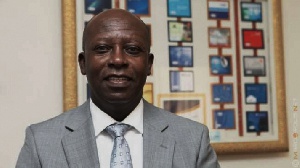 Archie Hesse, Chief Executive of GhIPSS
Archie Hesse, Chief Executive of GhIPSS
Patronage of people opting for express clearing of cheques has gone up by almost 80 per cent (79.26 per cent) in the first half of the year compared to the same period last year.
The latest statistics is contained in the half year report of the Ghana Interbank Payment and Settlement Systems (GhIPSS).
The increase in volume of the express cheque clearing transactions could be attributed to public education and awareness of the service.
The value of cheques cleared through the express window also went up significantly by 62 per cent.
The express clearing of cheques implies that when one pays in a cheque of a different bank into your account, the fellow could access the money on the same in just a couple of hours.
It is one of the services introduced by GhIPSS as part of its mandate to encourage non-cash forms of payments.
GhIPSS, together with the banks, last year, embarked on a public education to encourage the patronage of express clearing of cheques, and it appears that campaign is yielding dividends.
Despite the impressive growth in the volume of patronage for express cheques, more than 90 percent of cheques continue to be cleared through the normal system.
Speaking in an interview, the Chief Executive of GhIPSS, Archie Hesse, said because express clearing of cheques is need-based, it is not anticipated that it would compete with the normal clearing.
He noted that the close to 80 per cent increase in patronage for the express service is a very positive development.
Mr Hesse indicated that GhIPSS together with the banks would continue to educate the public on the existence of the express clearing of cheques so that people who need that service could request for it from their banks.
Currently, cheques clear between two to three days under the normal window and between two and four hours under the express window.
The GhIPSS Boss explained that the various improvements introduced into cheque clearing was to increase public confidence in the use of cheques for payments.
He indicated that because cheques clear faster today compared to the past, a lot of people, particularly individuals are comfortable in accepting it or presenting it as a form of payment.